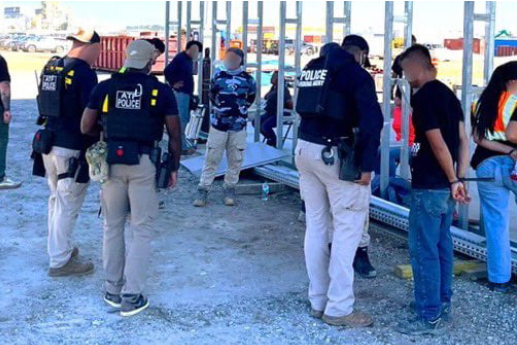
A large-scale crackdown on undocumented immigrants led by U.S. Immigration and Customs Enforcement (ICE) in Georgia has drawn significant attention. While officially framed as a move to "protect American jobs," there are interpretations that it may be targeting Korean companies that have recently made massive investments in the state. This operation is gaining more notice as it could go beyond a simple crackdown on illegal employment and place a considerable burden on the business activities of Korean companies in the U.S.
Large-Scale Joint Operation with Helicopters and Armored Vehicles
On September 4 (local time), a large-scale crackdown on illegal employment and federal crimes led by ICE was launched in Georgia. The ICE Newsroom website features a video showing helicopters and armored vehicles deployed for the operation, hinting at the seriousness of the situation. The operation involved multiple federal agencies, including the Department of Labor, the FBI, the DEA, the U.S. Border Patrol, the IRS, and even the Georgia State Patrol.
As a result of the operation, nearly 500 undocumented immigrants were detained, many of whom were found to be working illegally on short-term visitor visas. Steven N. Schrank, Special Agent in Charge of Homeland Security Investigations, emphasized, "While we welcome all companies that wish to invest in the U.S., they must hire workers through legal means." He added, "This operation sends a clear message that we will hold accountable those who exploit the system and undermine our workforce." He also stated, "Today's operation reflects our commitment to protecting jobs for Georgia residents, ensuring fair competition for businesses that play by the rules, and safeguarding the health of our economy."

The Intent Behind the Guise of Protecting American Jobs
The Georgia crackdown is particularly noteworthy because of its context. Recently, several large Korean companies, including Hyundai Motor Group, LG Energy Solution, and SK On, have made multi-billion dollar investments to build large-scale EV and battery plants in Georgia. This is expected to create numerous jobs in the state and significantly contribute to the local economy.
However, local experts point to the subtle perception within the U.S. regarding these massive investments. Aligned with the U.S. administration's 'America First' policy, there is caution that foreign corporate investment, while creating jobs, could also lead to the formation of a "shadow labor market" involving illegal immigrant employment or low-wage labor. Georgia, in particular, is a traditionally conservative state that has taken a tough stance on immigration issues. Although this joint ICE crackdown is outwardly a legitimate law enforcement action, it can be interpreted as an implicit warning to foreign companies in the U.S. to "strictly comply with U.S. laws and regulations" while also putting subtle pressure on them to "prioritize the hiring of American workers."
Challenges and Prospects for Korean Companies
Korean companies operating in Georgia are taking this crackdown seriously. They face the potential risk of unintentionally violating regulations due to a lack of understanding of the local labor market and complex immigration laws. Specifically, issues could arise if personnel dispatched from Korean headquarters or employees of partner companies do not meet visa requirements, which could significantly disrupt business operations.
This situation is not limited to Georgia. With the trend of strengthening regulations to protect domestic industries across the U.S., Korean companies need to prepare proactive measures, such as enhancing local legal consultation and overhauling internal systems. Merely increasing investment is no longer sufficient; they are now pressured to act as a responsible "member of American society" based on a deep understanding of the local community and culture.
This large-scale ICE crackdown presents Korean companies with a realistic challenge: "unforeseen regulatory risks," alongside the opportunity to enter the U.S. market. It is now time for Korean companies to adapt to this changing environment and seek new strategies for sustainable growth in the U.S. The U.S. government, while extending a warm welcome to "investment," is also emphasizing the strictness of law enforcement, effectively placing an "invisible chain" on them.
[Copyright (c) Global Economic Times. All Rights Reserved.]






























